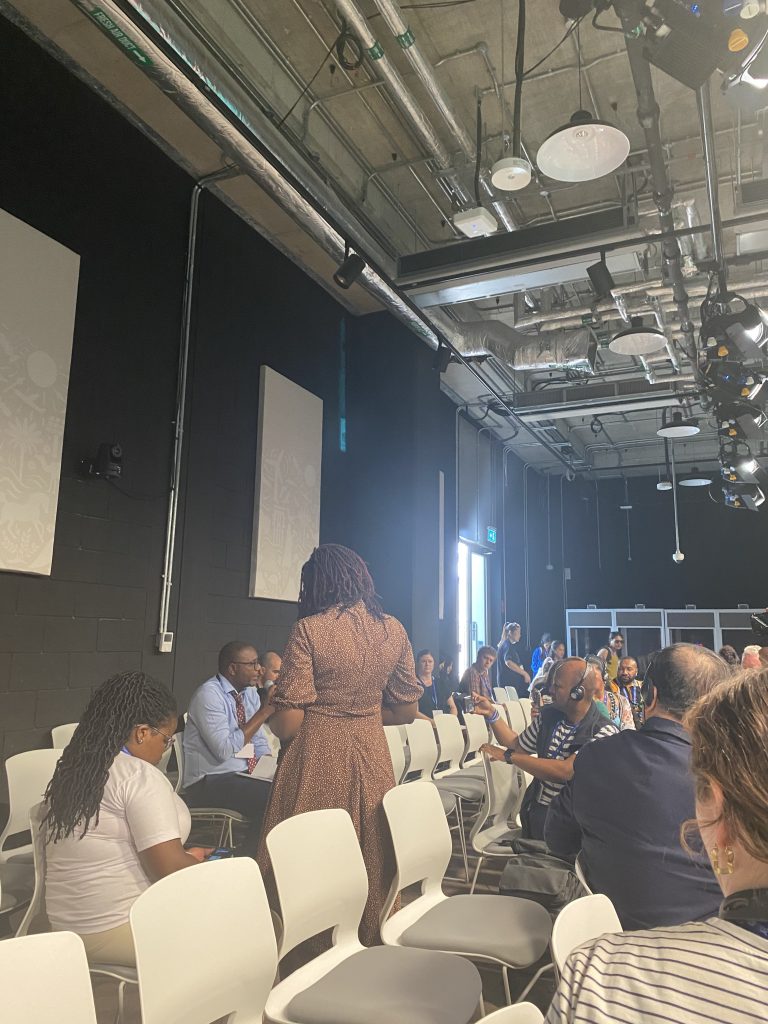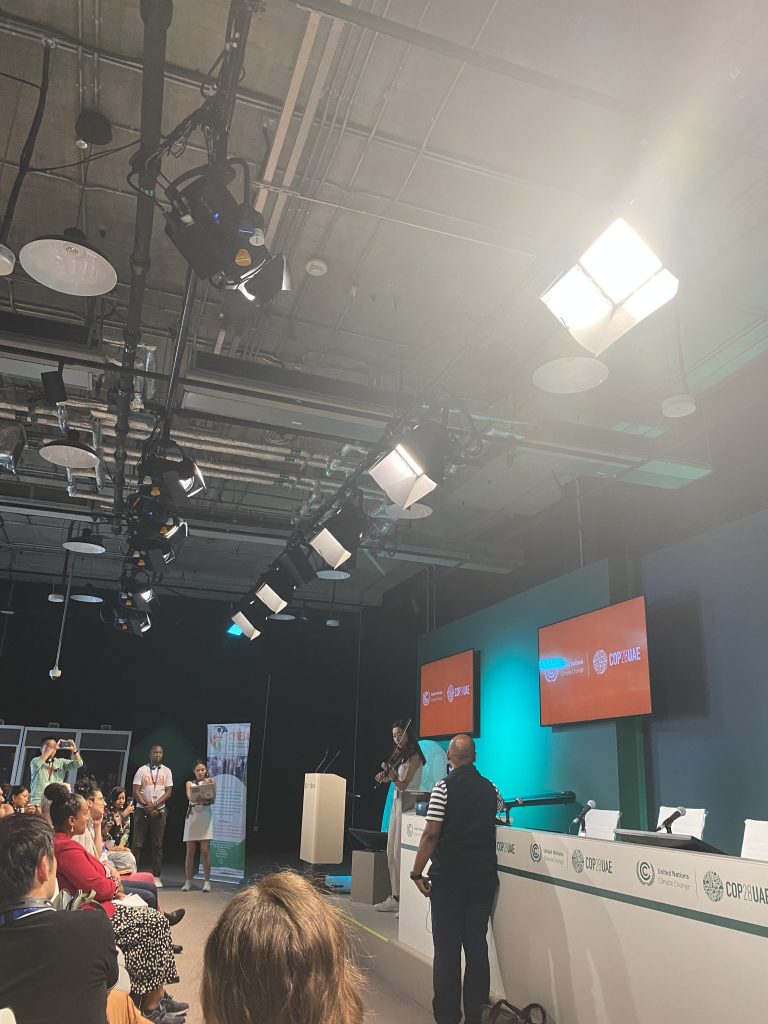“Environmental defenders are forgotten by COP.”
David Munene, the Programs Manager of the Catholic Youth Network for Environmental Sustainability in Africa opens this panel discussion with these harrowing words in a room where many of those forgotten sit.
Let me set the scene for you some. I am at one of the many COP28 side events where panel discussions of any and all topics relating to the environment take place. While I specifically chose to go to this event, I couldn’t have expected the impact it would have on me and how grateful I will continue to be to have been in that space. The event, “Youth Rising in Solidarity for Environmental Defenders and Safeguarding Lives, Nature and the Future” was a storytelling event that shared lived experiences of a few youth environmental defenders. According to the UN, environmental defenders are “individuals and groups who, in their personal or professional capacity and in a peaceful manner, strive to protect and promote human rights relating to the environment, including water, air, land, flora and fauna.”
“They offer you protection where there is none to be offered.”, Munene says in his introduction.

As you can see from the above photos, the panel chairs at the front of the room were empty. Unlike every other panel event I went to all the panelists were scattered throughout the audience seats. It was made clear by the event hosts that speakers should be at the same level of the audience, not above them. Wow. It is easy to forget the hierarchical and authoritative practices that seem to weave throughout almost everything we do. But this emphasis on having all individuals on the same footing begins to show you the extreme power this room holds to unravel the institutions that seek to destroy them. There were five speakers in total and I will highlight some of their stories.
Nansedalia Ramirez is a youth leader from Mexico. She says that her and her community have suffered due to mining and hydropower. Her home is among the forests. Her home is being logged and destroyed, and due to her activism she has faced several threats.
“As youth, we want to unite our voice, voices who can’t be heard, who are putting their lives in danger on a daily basis.” – Nansedalia Ramirez
“A young girl is being threatened for carrying the heart of the community.” – David Munene
Nidia’s family was forcefully displaced due to hydropower infrastructure in 1974. She wasn’t able to learn her own language. Her people lost their traditions, their dances, their culture, their food sovereignty. Her organization works to recover everything they lost. It was from her father that she inherited this fight and fighting spirit. Her father had been imprisoned due to his activism and his fight for his people’s rights and land tenure. She hopes to convince other youth to also continue this fight and to fight for their ancestors.
“Someone will publish a language that was lost…How do you discover a language that was lost?” -David Munene
Munene then ends with asking a woman named Annabelle to come up to the front to play violin for an “intermission” to “heal the soul.” The song is called “The End of the World”.

The last speaker I will highlight and the last of the speakers was Ina-Maria. She is from Namibia but was born in exile in Angola during the liberation struggle against South African apartheid occupation in Namibia. Her father, a commander, was killed in the war from a car bomb. She grew up in a refugee camp for a few years before being displaced to the former East Germany in 1985. This is why she speaks German as well now. Growing up in East Germany, she was told to fight capitalism from a young age, something she still holds in her heart now.
After 1990, she returned home to Namibia but notes that she “never really felt at home”. She was too black for the White elite in Namibia but too white for Black people there.
She found her passion in fashion design, but knew that she could not work in the fashion industry. She could not look past the industry’s exploration of the environment and of people, so she found her calling in community work.
In 2020, a Canadian company was going to begin fracking for oil and gas in the Kavango Basin. She felt betrayed. The actual people living there, never benefited or gained anything from the war. And since independence, the government has been captured more and more by corporate powers.
“But for me, you are not going to touch the Kavango. That is our homeland.”
Namibia is a very dry country, the Kavango delta is the only place they can grow food. It is the home to several endangered species. But it is also home of the first nations, to the San people. They are hunter gatherers who depend on their land.
Since many knew of her father and many of the kids that were exiled have become part of the elite community, she actually got a call from the Secretary General of the ruling party (who was actually her neighbor and someone she thought of as a friend before) to intimidate her from her activism. Unfortunately it did not stop there. After organizing a protest where they went to an UNESCO office, since the basin is an UNESCO heritage site, a PR person from UNESCO used their profile to get information about Ina Maria. This was a further attempt to intimidate and silence her and her efforts.
This Canadian company did zero community engagement early on. Without a newspaper article that came out about the fracking, no one in the community would have known. So when they were finally forced to start doing community engagement, Ina Maria went to one of the events. She asked them about their lack of community engagement, putting them on the spot. On her way out, she was approached by two police officers. They wanted to arrest her for causing a disturbance. She said she didn’t know how she got the strength, but she pulled out her phone and started filming them and told them to leave her alone. They got so scared that they let her go. But this was just a start, unfortunately. At COP26 she was chased and intimidated. She was able to speak before Greta Thunberg spoke, and was able to raise awareness about the campaign. After the conferences she had to stay behind for several weeks to do security training and other security measures. Even when she goes to a club or a restaurant she sees people taking photos of her that she knows are part of the oil industry. This happened that week as well during COP28. But no matter the threat and the difficulty, she is not afraid.
“Fear is not something in our hearts. I don’t even know what fear is. I just know I have to defend my homeland. There is space for a better world.”
Annabelle is then invited back up and is asked to also introduce herself. She is a young woman from Hong Kong who uses music to spread the message about climate change. “Music is always a tool to inspire, to empower people.”
Her second and final song is titled “Heal The World”.
“This event shows me why I am here.” – a man from west Papua says about COP when the floor is opened up for anyone to speak.
Munene ends the panel part, reminding everyone to “Now give names to environmental defenders…they are not just a statistic”, and to “call out their names when we need courage.” Environmental defenders; “they are just like you and I, but they are not afraid.” Fear isn’t in the vocabulary of environmental defenders. They knowingly put their lives in danger everyday fighting for the environment and the people. But they cannot stop, because if they dont fight, then who will fight for them? They continue to fight after seeing their land destroyed and threatened over and over again. But they prove their immense power and ability to organize, and protect the people and land over and over again.
For the last five minutes of the event, everyone is asked to stand up and to hold hands with the person to your left and right. We all end up in a big circle of sorts and are led through a spoken meditation. We are all reminded once again of the power love holds in all of us. To use love in our fight and let it flow throughout us as we go into the world. I close my eyes and take in all the feelings and emotions I have felt and seen today. It’s truly beautiful. I may not know the two people I am holding hands with nor all the people in the room personally, but I do know we all hold the same love and want to protect. I leave the room with nothing but hope.
